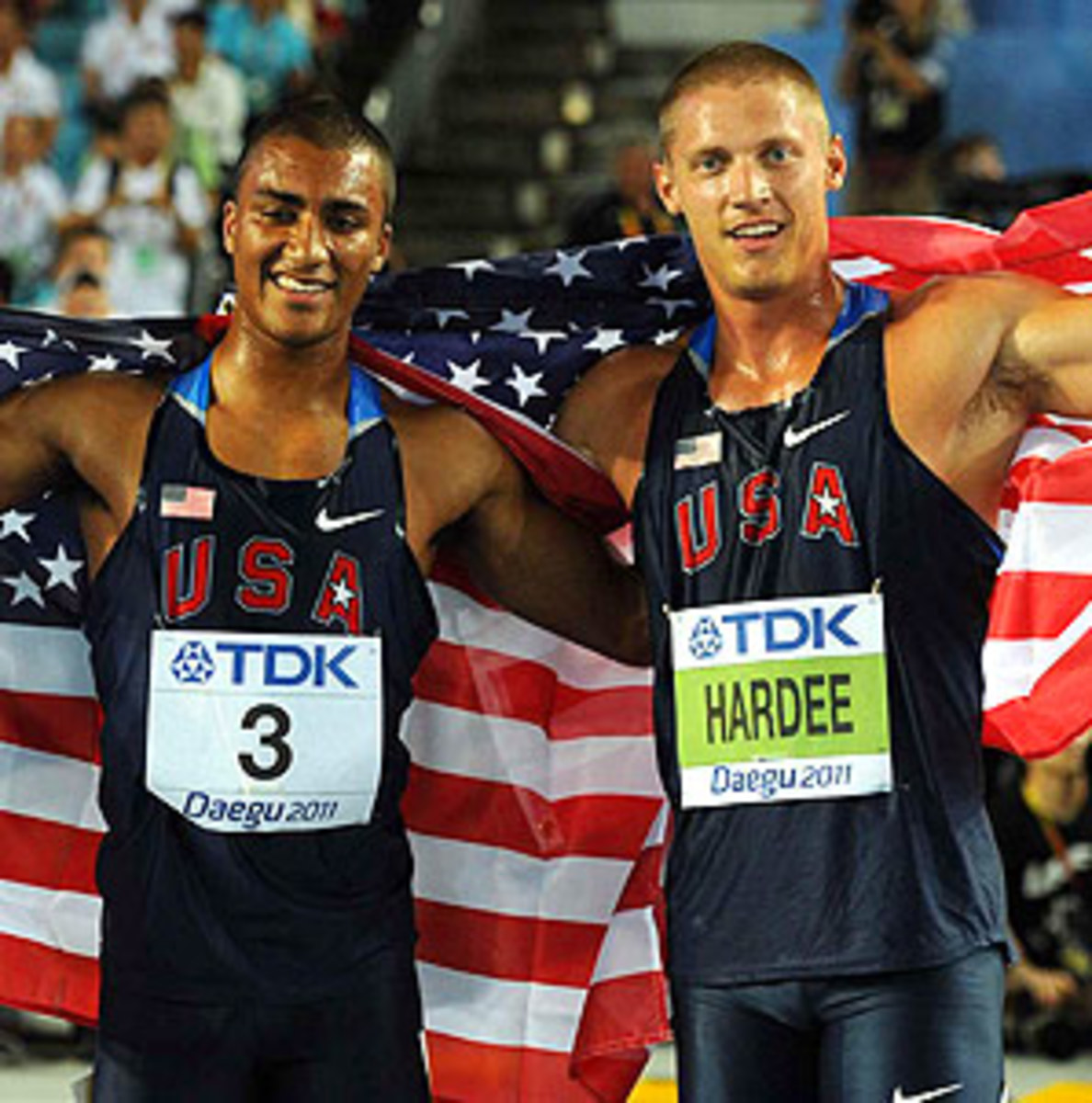
A suggested change to the false start rule; other Olympic notes
My SI colleague, Tim Layden, nailed it in his column on Saturday: the International Association of Athletics Federations' (IAAF) rule of ejecting track athletes for one false start is completely foolish. Jamaica's Usain Bolt, the sport's premier star and drawing card, was booted after jumping early in the final of the men's 100 meters at the Track & Field World Championships in Daegu, South Korea last week. The ejection was a blow for the entire sport, as spectators tuned in to watch the world's fastest man run.
Granted, the federation originally altered the rule to eliminate the delays and excessive gamesmanship caused by multiple false starts when each athlete (or even the field as a whole) is allowed one, but the rules' potential drawback was exactly the disaster we saw over the weekend. Bolt's early move made it almost certain that the rule will be amended before the Olympics in London, so the best aren't on the sidelines during the finals of track's marquee races.
But where exactly is the middle ground? The one-against-the-field rule (if one runner false starts, every athlete in the heat gets a warning, and the next false start is automatically disqualified, whether or not the runner jumped early before) punishes everybody equally, which isn't fair for the runner who holds his or her ground. That also opens the door for runners with slow starts to leave early in order to restrain those who can build a lead in the first 30 or 40 meters. The rule before that allowed each athlete to false start once before being disqualified, but that led to outrageous mind games among the runners, and ultimately, some serious meet delays.
Here's a suggestion: first, keep the rule as it is for every race longer than 110 meters (i.e. the 110 hurdles). There isn't any reason to jump in a 400 meter or even a 200 meter race, and the delays only serve to freeze the superior athletes, just as you would freeze a field-goal kicker or free-throw shooter by calling timeout. That shouldn't come to play in track. Second, having false starts charged to the field only encourages jumps by the slower starters. So why not allow each sprinter one false start for the meet. If you use it up in the semis, you're only putting yourself at a disadvantage. That should reduce delays over the meet's duration, while still allowing each runner one shot at catching a flier. It isn't a perfect solution, and there would still be finals with an additional start or two, but a runner such as Bolt, who wouldn't be hurt by a conservative hold in an earlier race, would still be around for the final.
--
It may be time to revisit the theme of Nike's Dan and Dave campaign featuring Olympic decathlon hopefuls Dan O'Brien and Dave Johnson before the 1992 Olympics in Barcelona. O'Brien and Johnson were considered good bets to win gold and silver in the Barcelona Games, but O'Brien shockingly no-heighted in the pole vault at the Olympic trials. O'Brien came back to win Olympic gold four years later in Atlanta, but not before the rivalry and expensive marketing drive went up in flames.
This time around, the U.S. has three contrasting, but compelling, decathletes. Trey Hardee, a former pole vaulter, finished 102 points ahead of teammate and U.S. champion Ashton Eaton to repeat as world champ in Daegu this weekend. The third, Bryan Clay, the reigning Olympic gold medalist and 2010 world indoor champ, sat out at worlds because of a knee injury. All three have won national titles, and all three have sights on 2012 Olympic medals.
--
The U.S. women's indoor volleyball team continued its recent roll by beating Brazil to win the world grand prix title in Macau, China, 26-24, 25-20, 25-21. Destinee Hooker paced the defending champs with 16 points, including 15 kills, leading all scorers and being named the tournament's MVP. Veteran Logan Tom added 12 kills, a block and an ace. The win avenged a four-set loss to the Brazilians in pool play last week, the only defeat for the U.S. women in nine matches of the pool round. This title is Team USA's fourth since 1995.
--
The IOC approved a request from Qatari officials to grant the right to potentially stage the Olympics between September 20 and October 20, accompanying Doha's bid to host the 2020 Olympics. With average temperatures exceeding 100 degrees in July and August, typically when the summer Games are held, the Middle Eastern city needed to get a special exemption to allow Olympic events to be held outside of the traditional summer season.
The list of bid candidates, which will be finalized this week, now also includes Tokyo, Madrid, Rome and Istanbul; the 2020 Olympics host will be chosen in September 2013. Late last week, officials from Las Vegas attempted to bypass protocol by submitting a 2020 bid to Lausanne without getting approval or endorsement from the USOC, which already announced it would not submit a U.S. bid to host those Games. Understandably, the stunt was rejected. Qatar has already won the rights to stage the soccer World Cup in 2022 and hopes to follow Rio as a city hosting World Cup and Olympic competition within the same quadrennial.
If the U.S. does submit a bid to host the Winter Games in 2022, expect two-time host St. Moritz to be a competitor. The Swiss ski haven, which played host in 1928 and 1948, would likely join forces with Davos to offer a combined bid. St. Moritz is also known as a highlight venue of the sliding-sport season because of its natural ice track.





